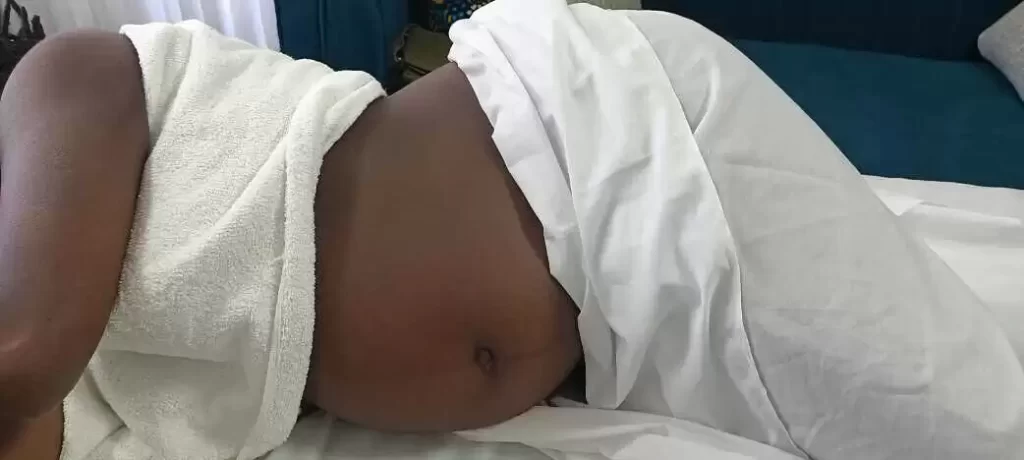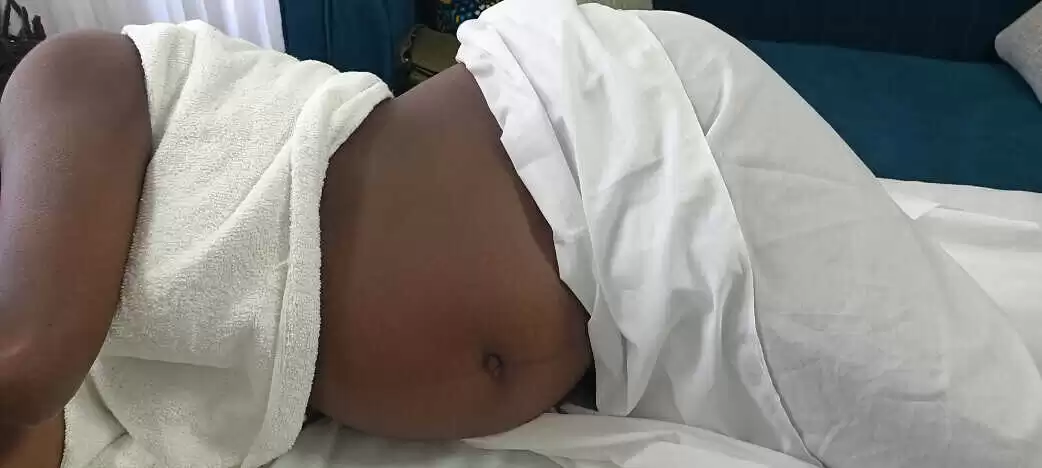
Psychosocial stress and depression are among the major risk factors during pregnancy, which may negatively impact the mother’s health as well as the development and growth of the fetus. With proper precautions, receiving a pregnancy massage is one of the best ways to keep your mental and physical health in top shape.
On this page
What is a pregnancy massage?

Also called a prenatal massage, a pregnancy massage is very similar to the standard full-body massage.
The main difference is that the massage therapist makes a few modifications to ensure the safety and comfort for pregnant woman and the baby.
Modifications from the regular massage
- Mama lays on her side and cradle a body pillow. The pillow will keep mama comfortable, yet allow the masseuse access to mama’s back.
- Mama doesn’t lay on her stomach. Not only is that unsafe, it simply isn’t comfortable! If you are in the second half of your pregnancy (after the fourth month), the weight of your baby and uterus can compress blood vessels and reduce circulation to your placenta creating more problems than any massage can cure.
- Mama doesn’t lay flat on her back either. In order to avoid pressure on the vena cava, mama will be semi-reclined with the use of pillows behind mama, as well as under her knees.
- While gentle pressure is safe and can feel heavenly, pregnant women are particularly susceptible to blood clots which deep tissue massage on the legs can dislodge. That, in turn, can be risky. On other body parts, the pressure can be firm and as deep or as gentle as you’d like. Always communicate with your therapist about what feels good and if something starts to hurt.

Benefits
- Reduces stress: Expectant moms have a lot on their minds: finances, health concerns, and the everyday stresses of pregnancy. Massage therapy can reduce the physical symptoms of stress, such as tight muscles and increased pulse, in expecting mothers.
- Relieves joint pain and sore muscles: If you find your muscles and joints are sore, massage can help relieve joint pain by keeping your muscles more flexible.
- Improves sleep: Many pregnant mamas find that increased worries and physical symptoms (e.g. sciatica, etc) make it hard to sleep at night. One study found that, when compared to a relaxation group, participants in the massage therapy group were able to sleep better at night.
- Reduces swelling: You might find yourself a little bit more swollen during pregnancy, but the good news is that massage can help reduce swelling.
- Relieves headaches: Many women find that the hormonal shifts during pregnancy can lead to an increase in headaches. In addition to addressing any underlying cause of headaches (such as dehydration), massage therapy can significantly reduce headache frequency.
- Alleviates heartburn: Pregnant mamas know the struggle that is pregnancy heartburn! Prenatal massage helps relieve heartburn by relaxing the nervous system and reducing stomach pressure.
- Improves circulation: This has been one of the biggest benefits of massage for centuries, whether you are pregnant or not. By improving your circulation, your body is able to deliver more nutrients and oxygen to your baby. This is important, because the more nutrients and oxygen baby receives, the better they can grow and develop.
- Stabilizes hormones: Prenatal massage reduces your stress hormone, cortisol, and increases endorphins, the feel-good hormones.
- Improves nerve pain: According to a study published in Acupuncture, massage relieves nerve pain. As the muscle is loosened, the muscle is less likely to press on the nerve and cause pain.
- Makes delivery easier: Women who received a pregnancy massage regularly had shorter labors (three hours shorter on average!) and less demand for pain medication. This is likely due to lowered stress levels.
- Relieves lower back and pelvic pain: As your center of gravity shifts during pregnancy, you might feel lower back pain. Sciatica and relaxed ligaments also contribute to lower back pain, but a prenatal massage can help improve these symptoms.
- Reduces risk of premature labor: One study noted that, in China, where prenatal massages and other forms of complementary medicine are regularly practiced, the rate of premature birth is only 1 percent (it is 14 percent in America!). Prenatal massage is thought to reduce your risk of premature labor, because it reduces cortisol levels.
When can a pregnant woman get a massage?

Pregnancy massages are generally considered safe after the first trimester. It’s important to let your massage therapist know you’re pregnant.
A massage during the first three months of pregnancy may trigger dizziness and add to morning sickness.
Risks
- If you were a heavy drinker, drug user or smoker prior to pregnancy, it may be best to avoid massage altogether to avoid any detox reaction.
- If the pregnancy is considered high risk, you should get check with your practitioner before receiving a prenatal massage. Complications that could make massage during pregnancy risky include;
- Diabetes
- Morning sickness
- Pre-eclampsia
- High blood pressure
- Fever
- A contagious virus
- Abdominal pain or bleeding
- Deep vein thrombosis, etc.
- Essentials oils contraindicated during pregnancy are avoided. For instance, clary sage oil (salvia sclarea ) should be avoided because it can trigger contractions. Other essentials oils to be avoided include rosemary and cinnamon.
- Certain areas will not be massaged. The abdomen, as well as any pressure points (around ankle, for example) that promote contractions or jump start labor, are avoided during prenatal massages.
Closing remarks

While any massage therapist can, theoretically, work on pregnant women, it’s best to go to a specialist who has a minimum of 16 hours of advanced training in maternal massage.
There’s no specific certification, so you should ask when you make your appointment. This way, you can rest assured you’re in the hands of someone who knows exactly how to relieve any pain and pressure related to your changing anatomy.
Let us walk you to optimal mental and physical health in the comfort of your home. Schedule your appointment and we will be at doorstep.
Was this post helpful? Share if you like it. Got questions/comments? Get in touch via email.
Last Updated on October 19, 2022

